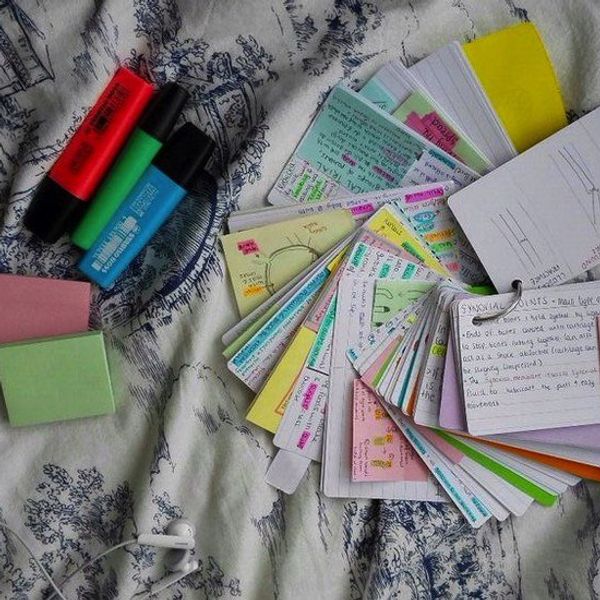Hard to believe it's already November, right? It felt like summer just ended a week ago and we just started our classes. The school year is flying by, and for us college students that means that finals week is almost upon us: the week of pulling all-nighters at the library and running on coffee and energy drinks. If you're a first-year freshman or just somebody who's not very good at studying, check out 10 tips on how to improve your study habits and ace your finals!
1. Turn your phone off
Let's face it, we can't go over an hour without looking at our phones, checking our messages or our Twitters. Our phones constantly distract us, especially when trying to study. If you're someone who likes to listen to music while they study, try putting your phone on "do not disturb" or on airplane mode so you won't be distracted with notifications. If you're someone who gets too distracted by their phone, simply turn it off or put it somewhere out of sight. This way your eyes won't keep glancing over to the screen and you won't get distracted every 30 seconds. I do this all the time while studying and it helps a lot.
2. Don't cram (especially for an important class)
It can get extremely hard to balance different classes and studying for all of them at once, but cramming the day before an exam is never good. Especially if it is an important class that is relevant to your major, take more time to focus on studying for that specific class. Time management is such an important study habit, and one way you can work on that is to plan out how long you will study for each class. You can even make a schedule if you want, divide up the hours, or study for one or two exams a day. Planning out your schedule will help prevent cramming.
3. Paraphrase your notes
Going over the same notes over and over again can get very tiresome and boring, but one way you can help remember them better is to rephrase them in your own words. It may take some thought, but it will help you fully understand the concepts and keep your mind focused.
4. Go to a quiet place
If you like to study in your dorm room or apartment, that's great. But if you have the TV blaring in the background or your roommates are being too noisy, go somewhere where you know it will be quiet. It does not have to be the library -- it could be a coffee shop, a lounge or even somewhere outside on a nice day. If you do go to the library, there are designated quiet areas on almost every floor, as well as study rooms that you can reserve to yourself or a group. I know I'm someone who gets distracted by many things so I always go to quiet places where I know I can focus.
5. Make your own study guide
This can go along with paraphrasing, but making your own study guide is one of the most helpful things I do to study. You can outline your notes or your textbook by chapter and put together a cohesive study guide that you can even share with your friends or classmates. I've shared study guides with people before and they told me that it helped them immensely. There are so many ways to make study guides so you can find a way that works for you and study in a whole new way.
6. Try studying alone instead of with friends
I know studying with friends can be fun and can take away some of the stress, but at the same time you probably won't get nearly as much done. Unless they're in the same class as you, your friends can be very distracting and it is easy to start talking for an hour straight and realize you haven't read anything. Studying alone lets you retain more information and you definitely focus better on the material.
7. Don't drink too much coffee or energy drinks
Trust me, I love coffee just as much as the next person, but if you're on your third cup at 11 p.m, that's not the best way to stay awake. Energy drinks are just as bad, as they contain so much sodium, caffeine and sugar that it is very unhealthy. My freshman year I wanted to pull an all-nighter so I drank a 5-hour energy drink. It worked for most of the time, but once it wore off I crashed and I was about to fall asleep right then and there. Don't force yourself to stay awake, but get an adequate amount of sleep.
8. Frame your notes: relate everything to you
Framing your notes means that you take the general concept and apply it to your life so that you can create a personal example. This way you're not simply studying definition after definition, but you will understand it much better if you can relate it to yourself. It definitely helps improve your memory and absorption of the materials, and creating examples is sometimes more effective in understanding ideas rather than reading it over and trying to remember it.





















